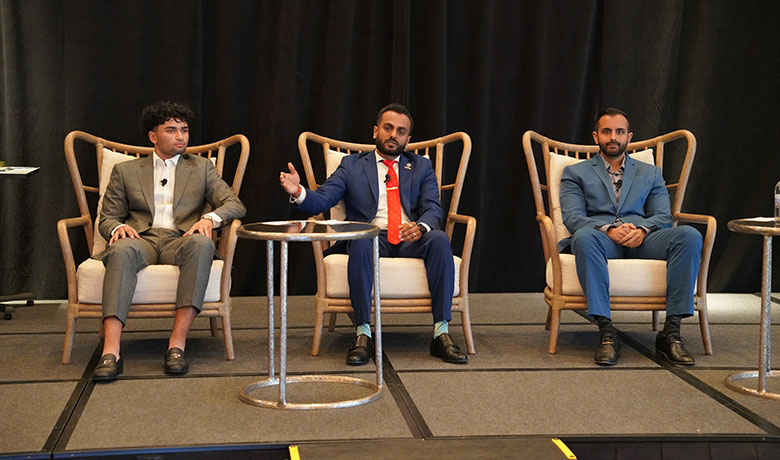
Owner’s Outlook
By Dennis Nessler | November 29, 2022
The ongoing labor shortage, fair franchising, and the latest legislative advocacy efforts were among the topics discussed by a trio of second-generation AAHOA members during a recent panel at the BITAC Owner’s event in Key Largo, FL.
The panel discussion, which was entitled “Owner’s Outlook: AAHOA Members Address Top Challenges, Concerns For Hoteliers,” chronicled the impact of the Asian American Hotel Owners Association (AAHOA) and highlighted some of the critical issues for individual owners.
H.K. Patel—an AAHOA board member representing the states of Kentucky and Tennessee—acknowledged that when it comes to political advocacy the lodging industry has a seat at the table with policymakers “a lot more now than we did before.” He detailed the association’s recent efforts pointing out that recently as many as 100 AAHOA members representing every state sat down with some 75 elected officials.
“They personally came and met with us and we showed them the numbers that were down year-over-year because of COVID issues and they were shocked. Like I said if we don’t tell them they won’t know, they have many more things to look at on a day-to-day basis so it is very powerful,” he said.
H.K. Patel also explained the association’s efforts with regards to PAC donations.
“Every person that we use the PAC money for is pro-business. It doesn’t matter the party, we help the ones that help us,” he said.
Meanwhile, franchising issues remain critical for hoteliers. As an example, H.K. Patel maintained that that AAHOA supports Bill 1958, which is currently on the books in New Jersey and supports fair franchising. He elaborated on some of the common issues between franchisees and franchisors.
“We’re on the opposite ends on certain points, but we have to look at it from the perspective where we can be on the same level; we want to make sure it’s fair. As an owner when its dictated that you have to do this or you have to do that, we don’t mind doing that if it’s consistent. For example, if you’re told to buy a product from a certain vendor and they say it’s because of ‘consistency’ but you can buy the same quality, same spec product from a different vendor at half the price and they won’t allow it. How is there consistency and how is there fairness in that?” he asked.
Armaan Patel, founder, AGA Hotels, and recent recipient of the Young Professional Hotelier of the Year award from AAHOA—cited a PIP
at a branded property as another example.“We had to do a PIP and it was only two years after the pandemic. So you’re not even making money during that time and you still have to do a PIP. It was unnecessary, you’re basically wasting money and you’re not even getting the guest results that you want,” he said.
Bhavik Patel, young professional director, eastern division, AAHOA, and managing director, Conor Acquisitions, acknowledged the aforementioned points but suggested a unified approach toward solutions.
“The other side is we also have to work together with the brands. It is a relationship and you are in an agreement with them. There’s a lot of other bigger issues as well,” he said, in reference to OTA’s cutting into profitability and the growth of home sharing sites like Airbnb.
Bhavik Patel added, “it’s a harmonious relationship where we have to work together to conquer the bigger picture as well while still maintaining the smaller picture.”
One of those large issues is labor and the current shortage within the industry. H.K. Patel noted the association has been working with universities and business schools, and even through international visa programs, to try and attract new talent to the industry.
Nevertheless, he acknowledged it remains a serious issue.
“There’s no way of hiding from the shortage in labor. When we’re talking about the shortage now the problem is people know that you are in need of people so now they’re demanding more,” he said.
Bhavik Patel amplified the point noting that minimum wage is expected to exponentially increase in states like Florida through 2026.
“Costs are going up across the board. My labor costs have doubled, and almost tripled. That’s going to be a huge dent into operating margins and that’s a big upcoming issue that’s going to be reflected everywhere in the next couple of years,” he said.
Bhavik Patel did noted “we’re starting to see more and more investment” into technology solutions like self check-in. “I think as the increase in labor cost continues automation will continue as well. But in the end the hospitality business is a guest-facing business so you want to have that interaction in a way,” he said.
H.K. Patel acknowledged some of the challenges as well.
“We have several vendors working with AAHOA, such as for a self check-in kiosk, and it’s half the cost when you look at it from the payroll perspective. But the problem we’re seeing is it’s not working with franchisees because the system is not integrated yet. I think in the near future, maybe a couple of years down the road, they’ll integrate together,” he said.






Get involved!
Comments